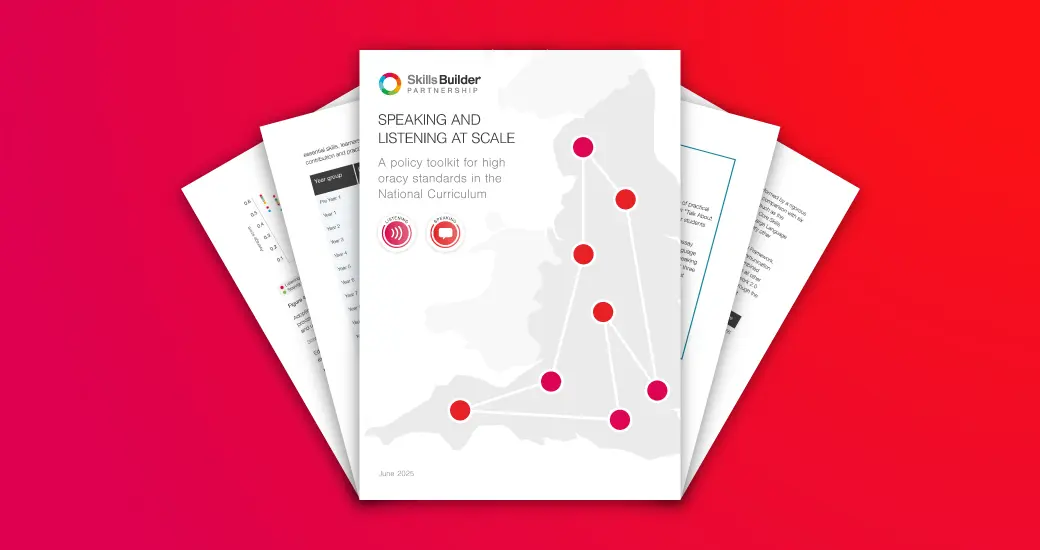There is broad consensus on the importance of oracy and urgent need for change in the curriculum. In 2024, the Oracy Commission's report, We Need to Talk, highlighted the "patchy and inconsistent" provision of oracy in England. We are delighted to have published a new report, Speaking and Listening at Scale, which provides a clear and actionable toolkit for policymakers on how to build speaking and listening skills into the national curriculum effectively. These essential skills sit alongside Creativity, Problem-Solving, Teamwork, Leadership, Planning and Adapting as fundamental to preparing young people for life and work. With input from experts in developing speaking, listening and communication skills, this report contains research summaries, reflections on past policies and case studies to provide evidence-based recommendations for the government in order to deliver high standards for all students in England.
We have been overwhelmed by the positive response and are so pleased to see the report recommendations being championed by educators, experts and parliamentarians alike.
Lord Knight of Weymouth welcomed the publication of the report in Parliament:
"'Speaking and Listening at Scale’ builds on the excellent work of the oracy commission, and its publication is timely as we await the final report from the Curriculum and Assessment Review. As a policymaker and parliamentarian I welcome these practical recommendations to ensure all children and young people build these skills. The evidence is clear: we know from the research by NFER and the Essential Skills Tracker that young people need these essential skills to thrive in the world of work, and as humans. We need to be critical in our use of these artificial technologies, which essential - human - skills like speaking, listening, creativity and adapting allow us to do."
The problem
The case for change is more compelling than ever. With the government announcing votes at 16, the world of work evolving and the seismic rise of AI - essential skills like speaking and listening are more important than ever.
These skills are important for academic outcomes: research by the Educational Endowment Foundation shows that speaking and listening interventions can have a high impact on pupil’s academic outcomes (six months of additional progress). Beyond the classroom, these skills enable for civic engagement and media literacy, empowering young people to analyse bias and critically evaluate information, which is sorely needed in an age of misinformation.
Olivia Platman, Programmes Director at the Economist Educational Foundation shared how they are using the Universal Framework to tackle this issue:
“Between 12-15 the most commonly used news source is TikTok. We want students to have the opportunity to discuss big issues that they’re talking about in the playground in the classroom, honing their speaking and listening skills. Topical Talk is designed to empower teachers to support students to think critically and to be able to share their views in a safe environment. The Universal Framework is perfect for identifying elements of these skills needed for media literacy like questioning sources, recognising, influence, using facts and negotiating.”
Despite their importance, there is a persistent disadvantage gap in these speaking and listening skills among students. Students from less advantaged backgrounds often have fewer opportunities to develop essential skills in education. This is particularly problematic given that employers consistently rank communication skills as a top priority and report significant gaps in school leavers and graduates. Providing all children and young people with a quality education that builds their speaking and listening skills isn’t a nice to have- it’s fundamental to social justice and ensuring every child has the opportunity to succeed, regardless of their background.
How clear, age-related expectations deliver high standards for all
The upcoming final report from the Curriculum and Assessment Review presents a once-in-a-generation opportunity to get this right. We must learn from past mistakes. Policies like the "Whole Language" reading instruction movement in California failed because they rejected the explicit teaching of foundational skills, leading to a "dramatic decline in literacy rates". This is an important lesson: simply acknowledging the importance of a skill is not enough. We must provide a structured, progressive framework for teaching it.
This is precisely why we are calling on the government to set clear, progressive, age-related expectations for essential skills like Speaking and Listening. The Universal Framework is a ready-made, open source model: breaking down Speaking and Listening into 16 granular, teachable steps that can be mapped to age and stages across the curriculum.
These recommendations have been widely backed by the sector. Amy Gaunt (Head of Impact, Influence and Learning) shared:
“This report makes a compelling case for the economic value of speaking and listening, adding to evidence that oracy underpins learning and improves attainment. We need more comprehensive, detailed guidance around oracy in the curriculum. Currently while it's there, less than 50% teachers are confident that their school meets the limited statutory requirements that exist. The recommendation around progressive, age-related expectations is really important.”
A call to action
The ongoing Curriculum and Assessment Review provides the perfect opportunity to rectify the issues with current national curriculum that hold so many students back.
Recommendations from this report sit alongside our calls for government to integrate all the eight essential skills (including Problem Solving, Creativity, Planning, Adapting, Leadership and Teamwork) into the curriculum :
- Set clear, progressive, age-related expectations for essential skills: The adoption of a nationally recognised, progressive framework for essential skills, including Speaking and Listening from Early Years Foundation Stage (EYFS) through Key Stage 4 and into Post-16 education, detailing clear, teachable steps and age-related expectations.
- Support robust and varied assessment methods for Speaking and Listening skills through a balanced assessment strategy that prioritises diagnostic and formative assessment to enhance learning, alongside the exploration and piloting of robust, multimodal summative methods.
- Set an expectation of explicit teaching that focuses tightly on the different steps of Speaking and Listening skills, teaching knowledge about physical, linguistic, cognitive, and social-emotional dimensions of Speaking and Listening.
- Set an expectation of structured practice for speaking and listening across the curriculum: students must have varied opportunities to apply and practice their speaking and listening skills.
- A resolute focus on inclusion, ensuring all national Speaking and Listening initiatives provide targeted support and resources for diverse learners, including those from disadvantaged backgrounds and those with Special Educational Needs and Disabilities (SEND) or English as an Additional Language (EAL).





